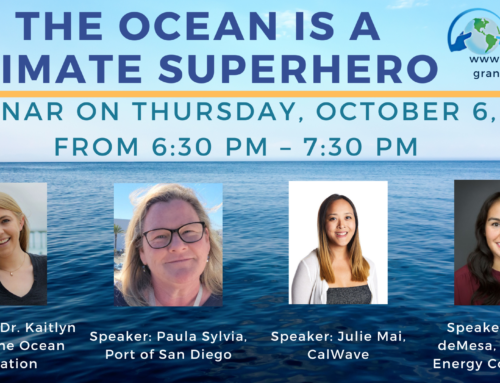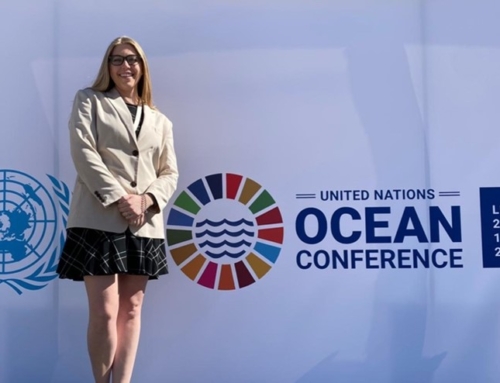At our meeting on December 8, we honored and welcomed Dr. Richard Somerville for his  early and ongoing efforts to explain climate science clearly to the public, presenting him with a Grandkids’ Climate Defender award.
early and ongoing efforts to explain climate science clearly to the public, presenting him with a Grandkids’ Climate Defender award.
We were honored to have Dr. Somerville share his insights on recent global climate developments at this event. Considering the upcoming holidays, he spoke about how to handle that family member who is a climate change skeptic. Dr. Somerville calls this contrarian “Uncle Pete.” After all, most of us have at least one family member who holds this belief that climate change is a hoax. (To read the article that Dr. Somerville wrote about Uncle Pete, click here.)
 Despite what Uncle Pete thinks, 97 percent of scientists agree on the fundamental facts, that climate change is human-caused by the burning of fossil fuels. As Dr. Somerville said, “The world is warming. It’s not a hoax. We measure it. The warming did not stop in 1998. All the warmest years are recent years. 2016 will be the warmest year on record. 2015 is second. 2014 is third. The atmosphere is warming, and so is the ocean. Sea level is rising. Ice sheets and glaciers are shrinking. Rainfall patterns and severe weather events are changing. Climate change is real, and serious, and happening right here, right now. And it isn’t natural. Human activities are the dominant cause of the climate changes we have observed in recent decades.”
Despite what Uncle Pete thinks, 97 percent of scientists agree on the fundamental facts, that climate change is human-caused by the burning of fossil fuels. As Dr. Somerville said, “The world is warming. It’s not a hoax. We measure it. The warming did not stop in 1998. All the warmest years are recent years. 2016 will be the warmest year on record. 2015 is second. 2014 is third. The atmosphere is warming, and so is the ocean. Sea level is rising. Ice sheets and glaciers are shrinking. Rainfall patterns and severe weather events are changing. Climate change is real, and serious, and happening right here, right now. And it isn’t natural. Human activities are the dominant cause of the climate changes we have observed in recent decades.”
So, why won’t many climate change contrarians accept the fundamentals of climate change? For skeptics like Uncle Pete, climate change is not a science topic. It is, for them, he argues, simply an opportunity for government to create rules and regulations that interfere with free markets and diminishes the personal freedom of individuals. This view has nothing to do with science. No argument based on just the science will change Uncle Pete’s mind.
However, climate science tells us that doing nothing will cause devastation. In the decades and centuries ahead, coastal cities will become abandoned because of rising sea level. We’ll see destabilization of governments and vast numbers of environmental refugees. Locally, climate change will increase drought and this will result in more intense and frequent wildfires. The changes to our ocean will put a strain on our tourism and fishing industries. We’ll also see impacts on agricultural, public health and air quality.
A new presidential administration may be able to reverse some good environmental policy, but Dr. Somerville also spoke about the good forces on climate change action that will continue. He believes there are solid reasons for optimism. One reason is economics. The open market is betting against fossil fuels – coal companies are going bankrupt, and in many cases renewal energy created by solar and wind is becoming cheaper than energy from fossil fuels.
It is becoming clear that decarbonization is increasingly driven by market forces, not command from the federal government. For more on this topic, read Salon’s article titled “Renewable energy is here to stay: The industry has grown up, and it’s too big to kill.”
Also, energy policy in the US occurs mainly at the state level, not at the federal level. California, for example, under the Clean Air Act, has its right to set its own standards for fuel economy and vehicle emission standards. And historically, other states often follow California’s standards. We also set our own building codes and energy efficiency standards. (California has pledged to generate half the state’s electricity from renewable sources by 2030.)
Thank you to the 30 members for attending this event on December 8 and for supporting the mission of STAY COOL for Grandkids and helping to raise more than $1,200 for our programs in 2017. Click here to learn more about our 2016 Year in Review.



